Carers stressed amid plans to tighten visa rules
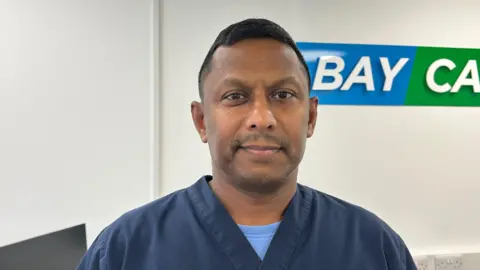 BBC
BBCOverseas people working in adult social care have said they are "afraid" about proposed changes aimed at making it harder for international workers to remain in the UK.
Currently carers gain the right to live and work here indefinitely if they have been working in the country on a sponsored visa for five years.
A new UK government white paper proposes increasing that to 10 years to reduce reliance on international workers and boost the recruitment and retention of homegrown talent.
Sumedha Aryaratne, a migrant worker from Sri Lanka who moved to Dawlish in Devon with his family to work in domiciliary care in March 2023 said: "I'm stressed. I'm thinking about it all the time."
Mr Aryaratne, 42, is on a care sponsorship visa - a type of skilled worker visa that allows overseas nationals to work in UK adult social care roles under a licensed employer.
He said: "We have fully integrated into society, my wife works, I work, we pay taxes, my kids have made new friends. It's an anxious time for us.
"We are the front line of domiciliary care. This will affect everyone across the board."
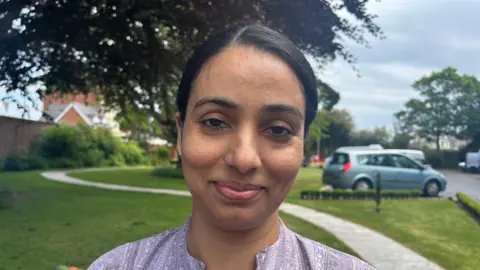
There were 27,174 health and care worker visas granted in the UK to main applicants in 2024, an 81% decrease compared to the previous year according to Home Office data.
Jini Jose, 37, moved to Torquay from India almost three years ago and said she is also worried.
She said: "This country is giving us the opportunity to bring our families and we can get a good education for our kids. This news is very sad.
"If we are not allowed to stay, we will have no option than to go back. We hope they will change the rules."
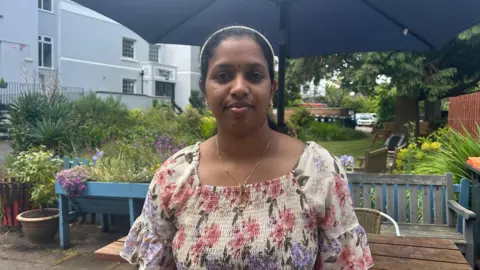
Her colleague Soumya Sebastian, 42, is also originally from India, and worked in Israel for nine years before deciding to come to the UK because she was able to bring her family here.
"We are very afraid of our future. We left our job there to come here, for our family and our future", she said.
The pair work at Sefton Hall care home in Dawlish.
'It's wrong'
The home's manager, Gabriela Ogreanu, said: "They have such high respect for the elderly. They are family oriented, they are part of the community, their contribution is massive.
"We try to recruit locally from Dawlish but we barely have one or two applicants to do the job. The government says we have to recruit locally, but who wants to do the job?"
Ms Orgreanu added she has a high number of staff who are anxious because of the uncertainty.
She said: "You open the borders, you allow these people to come in. You allow them to bring their families, to rent, to integrate into the community.
"But then you suddenly decide that actually it's too many of them and can we send some home. It's wrong."
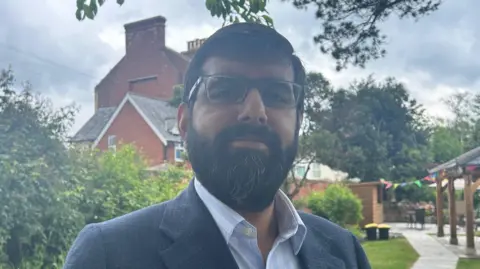
Naeem Ahmad runs Eschol House Nursing home in Portscatho, Cornwall and employs seven international staff.
He said he feels the signalling that's coming from central government around migration is "wholly negative" and is "not good for morale" in his team.
A Department of Health and Social Care spokesperson said: "We recognise the scale of reform needed to make adult social care attractive as a career: we want it to be regarded as a profession, and for the people who work in care to be respected as professionals.
"That is why we are introducing a new Fair Pay Agreement and implementing the first universal career structure, giving care workers better pay, conditions, and new opportunities to progress in their career."

Katrina Hall founded the Bay Care Group in Torbay.
She said: "We have 156 international workers. If we lose that workforce, it will cut 40 percent of our provision.
"We cannot get a British workforce here. We spent around £100,000 a year in advertising for British workers.
"All we got were people on benefits who came to have an interview in order to continue to receive benefits. We've literally become a revolving door for people looking to continue claiming their benefits."
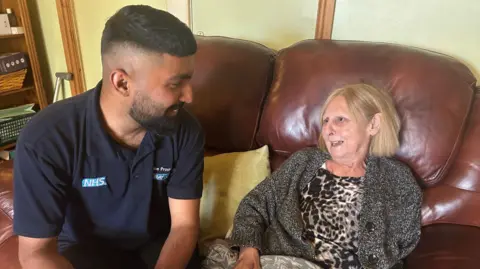
Irena Cox is one of Bay Care's clients is Irena Cox who has carers visit her home in Torbay five times a day.
She said: "They've been good enough to come over and work here. It means a lot, especially when you are vulnerable. I can't walk very far, I can't stand up very long.
"They are brilliant."
The Home Office estimated the new policies could lead to a 100,000 drop in immigration per year by 2029.
'Fair and selective'
Home Secretary Yvette Cooper said it is "time to end that care worker recruitment from abroad" and rules will change this year - instead requiring firms to hire British nationals or extend visas of overseas workers already in the country.
Successive governments have tried unsuccessfully to reduce net migration, which is the number of people coming to the UK minus the number leaving.
Net migration climbed to a record 906,000 in June 2023, and last year it stood at 728,000.
Prime Minister Keir Starmer argued the proposals bring the immigration system "back into control", and said the new plans, which tackle legal migration to the UK, would ensure a "selective" and "fair" system, where "we decide who comes to this country".
Follow BBC Cornwall on X, Facebook and Instagram. Follow BBC Devon on X, Facebook and Instagram. Send your story ideas to [email protected].
